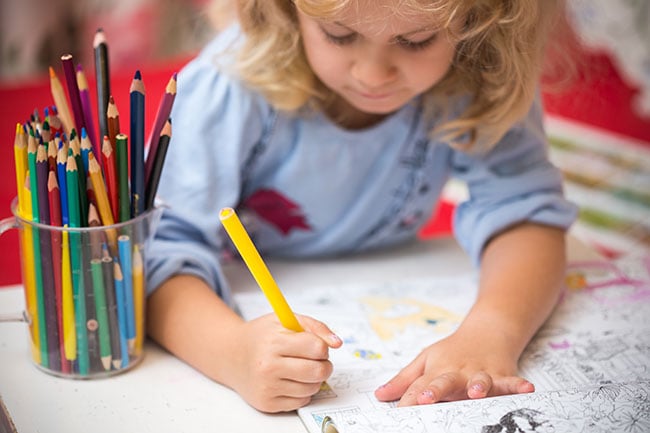
Feeling a little unsure about where to start with homeschooling this year? One of the things that can help is having a homeschool kindergarten schedule in place.
There are many great benefits of homeschooling, but when you’re first getting started you might be a little unsure about what it looks like.
How long should you do math? How many subjects should you tackle in a day? What about P.E., co-ops, and meeting friends?
Every family eventually settles into their routine, but when you’re first getting started it’s super helpful to have some sort of structure.
In this post, I’m going to share with you our family’s homeschooled kindergarten schedule as well as tips to help you create one that works for your family. That way you can confidently move forward with homeschooling.
What Is Homeschool Kindergarten?
As parents, we want to make sure that we give our children the best education possible. We know that this can be difficult, especially when you have a busy schedule. That’s why you should consider homeschooling your child. If you’re interested in learning more, then keep reading.
When you decide to teach your kids at home, you’ll need to create a curriculum. This will help you plan everything from the lessons to the homework assignments.
You can also use online resources to find free lesson plans. You can either search through the internet or ask other moms for their suggestions.
Another thing that you might like to do is to hire a tutor. This way, you won’t have to worry about teaching your kid yourself.
If you’d rather learn how to homeschool your child, then you can start by watching videos on YouTube. There are plenty of great tutorials available for you to watch.
There are many benefits associated with homeschooling. For example, it allows you to spend time with your family instead of being stuck in school all day long.
It’s important to remember that there are some things that you can only learn when you are in a classroom setting. However, you don’t need to let this stop you from homeschooling your child.
What Is a Kindergarten Schedule?
A kindergarten schedule refers to a daily routine that children follow when they go to school. This type of schedule helps teachers to know exactly how much time each child spends studying, playing, eating, etc.
When you homeschool your kids, you need to make sure that you create an effective kindergarten schedule. If you don’t have one, you should start by creating a list. Then, you can add more items to the list until you get everything covered. Here are some suggestions on what you can include in your kindergarten schedule.
• Reading assignments
• Math homework
• Science experiments
• Art projects
• Physical education
• Music lessons
You also want to make sure that all of these activities are broken down into smaller chunks so that they’re easier for the students to complete. You may even consider using timers and clocks to help keep track of the amount of time that your student needs to spend in certain areas.
If you’d like to learn more about the importance of having a good kindergarten schedule, then you should check out this article. It explains why it’s important to plan when teaching your kids.
What Are the Benefits of a Kindergarten Schedule?
A lot of parents choose to send their children to school at age five rather than waiting until they’re six years old. This is because many people believe that kindergarten will help your child become more independent, social, and mature. However, there are also some drawbacks to starting them early.
One of the most important reasons why you might want to wait until a young age to start your kids in school is so that you can give them extra attention when they need it. When you have a kindergartener, you can spend time with him or her every day. You don’t necessarily have to be working outside of the home to get this kind of attention.
Another benefit of a preschooler’s schooling is that you’ll be able to teach your child basic skills like reading and math. Many people feel that these subjects are best taught in elementary school. If you’d prefer to skip all of this, then a preschool program may work just fine.
However, there are other disadvantages associated with homeschooling. One of the main issues is that you won’t have any control over your child’s education. There are also some concerns about whether or not the curriculum will be appropriate for your child.
How to Make a Homeschool Kindergarten Schedule?
When you’re starting your child off on the right foot by creating a well-rounded education plan, the first thing that you should consider is the age of your children. If you have two young kids who are still learning how to read, then you might want to start them early. On the other hand, older students may need more time to learn everything.
It’s important to note that each student will be different. For example, some children may take longer to master certain subjects than others. You can’t force anyone to learn anything. Instead, you’ll just need to figure out what works best for your family and your lifestyle.
If you’re looking to create a homeschool kindergarten schedule, then you’ll need to decide what type of curriculum you’d like your children to follow. This means that you’ll need to choose from several options. Some of these include:
• Classical Education – A classical approach to teaching focuses on memorization, comprehension, critical thinking, and creativity.
• Montessori Method – The Montessori method is based on the idea of encouraging independence in your child. It also involves developing their physical, social, emotional, and intellectual skills.
• Reggio Emilia Approach – This approach emphasizes play and discovery as a way to help children develop.
Easy Tips on How to Create Your Kindergarten Schedule
You’ve decided that you want to homeschool your child, but you’re worried about how you’ll manage to keep everything organized. Fortunately, you don’t have to worry about this. With a little bit of planning, it’s easy for you to make sure that all of the work gets done.
When you first start homeschooling, you need to set aside time for each subject. This means that you should try to stick to an established routine so that you can get through the day without running into problems.
If you decide to use a daily planner, then you will be able to write down all of your lessons and assignments. If you prefer using a notebook, then you can simply take notes whenever you come across something that needs to be written.
Another thing that you might consider is to find some kind of online calendar. You could use Google Calendar or another similar program. When it comes to scheduling, you may also want to look at the free app called ClassDojo.
There are lots of other ways that you can organize your life as a parent. But, if you want to stay on top of things, then a daily planner is a great option for you.
What Kind of Activities Do You Want to Teach Your Child in Kindergarten?
Firstly, let’s understand the goal of an effective kindergarten program.
It provides your child with an opportunity to learn and practice the necessary social, emotional, problem-solving, and comprehension skills that will be used throughout any child’s schooling.
The development of self-esteem is one of the most important learnings through kindergarten.
This helps your child feel good about what their personality dictates and develops the confidence to tackle the challenges of learning.
Kindergarten teaches cooperation over groups: the former being the ability to work, learn, and get along with others while the latter is more individualistic.
A year in a good kindergarten school provides the child with the opportunity to practice patience, as well as the ability to take turns, share, and relate to others — across all social and emotional learning skills that would be used throughout one’s school years and in one’s professional career.
Most children are inherently curious but do not know how to control their curiosity and make the best of that gift.
Kindergarten, again, becomes a place that sparks and nurtures this very curiosity into usable skills through extra activities for students.
Kindergarten Extracurricular Activities For Children
1. Language Learning
Due to the heterogeneity in the backgrounds of students coming over to a kindergarten, the possibility of getting exposed to different languages is high.
Guiding a child in understanding any language sharpens their ability to comprehend not just words but emotions as well. They also recognize gestures more effectively.
2. Craft Making
Precision and particularity are what a child learns through craft-making.
It teaches them patience along with behavioral skills that involve dealing with anything delicately first instead of losing patience.
3. Singing
This helps better communication skills through vocal modulation. Every class day could start with a song instead of allotting a separate singing class.
This would also help start the class on a positive and happy note.

4. Dancing
Everyone loves dancing! It helps improve confidence and helps teach children the idea of exercising one’s body from an early on.
5. Indoor or Outdoor Sports
Something as simple as a coordinated game of catch-and-throw can teach children how to control their movements and help develop muscle memory.
6. Painting or Doodling
The idea of using colors to add life is something that can be developed in any child from as early on as kindergarten.
Art, after all, does not answer to any age, but only to perception.
7. Mild Combat Arts
Apart from staying physically sound, combat or martial arts also teach students the basics of protecting themselves.
8. Reading
The epitome of any health education is what reading is! At the kindergarten level, reading can involve going through colored storybooks.
This would eventually grow into more mature reading.
9. Non-Fire Cooking
Cooking teaches children the importance of being self-reliant in terms of daily sustenance. This is important because it also teaches them the importance of food in general.
10. Board Games
Strategising and co-ordinating is an essential aspects of any form of education and board games help achieve that skill in a fun manner.

